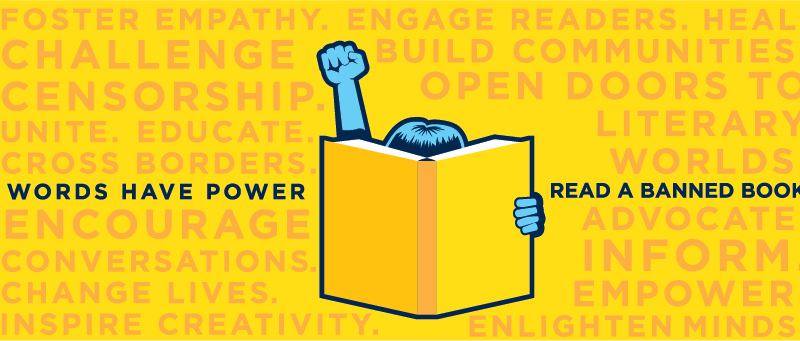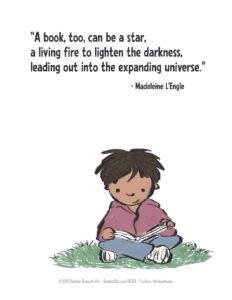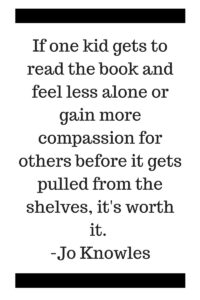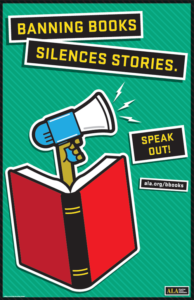Unlocking Minds: The Battle Over Banned Books and the Power of Free Thought
Unlocking Minds: The Battle Over Banned Books and the Power of Free Thought
Siby Shaji
Introduction
- In a world where information and ideas flow freely, the concept of banning books may seem archaic or even regressive. However, throughout history and even in the present day, certain books have faced censorship, removed from libraries, challenged in schools, and restricted from young readers. While the intent behind banning books may be rooted in concerns over sensitive or controversial content, it’s essential to recognize that these banned books often hold immense value and provide valuable learning experiences for young minds.
- The act of banning books raises important questions about intellectual freedom and the right to access information. When children realize that certain books are deemed unfit for their consumption, they become aware of the limitations imposed upon them by censorship. This awareness sparks discussions about the ethics and implications of restricting access to knowledge, fostering a desire to safeguard intellectual freedom not only for themselves but for society as a whole.
- As we delve into the reasons why children should read banned books, we embark on a journey that celebrates intellectual curiosity, critical thinking, empathy, and the limitless potential of young minds. By embracing the power of these forbidden narratives, we empower children to become well-rounded individuals who appreciate diversity, challenge injustice, and champion the freedom to explore ideas without fear or restriction. Let us embark on this exploration together, recognizing the immense value of banned books in shaping the minds of our future generations.
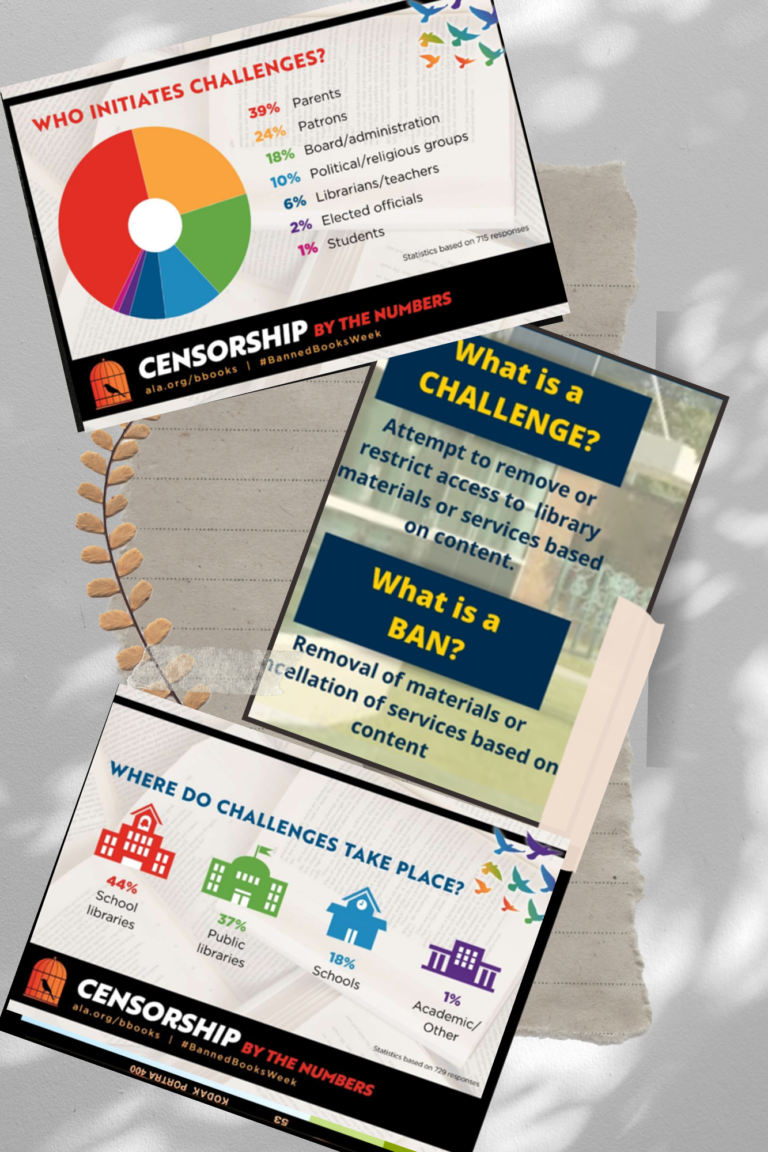
Let’s delve deeper into each of the points about why children should read banned books:
Encouraging Critical Thinking:
Encouraging critical thinking through the reading of banned books is paramount in a child’s intellectual development. These books often delve into controversial themes and ideas that challenge the status quo and societal norms. As children engage with such content, they are compelled to confront complex moral and ethical questions, forcing them to think critically about the world around them. By exploring characters with diverse viewpoints and motivations, readers learn to evaluate choices and consider different perspectives, honing their ability to analyze multifaceted issues. Banned books frequently depict protagonists who challenge oppressive systems, inspiring children to question authority figures and question established norms, thus nurturing their critical thinking skills. Moreover, these books often embrace ambiguity and nuance, teaching children that real-world issues rarely have simple answers and encouraging them to ponder the complexities of moral dilemmas. Reading banned books also leads to thoughtful debates and discussions, where children may encounter ideas that differ from their own, prompting them to articulate their thoughts, defend their positions, and consider opposing viewpoints—a vital aspect of critical thinking. In essence, exposing children to banned books enriches their intellectual development by instilling in them the capacity to question, analyze, and evaluate, preparing them to be informed, discerning, and thoughtful individuals as they navigate the complexities of the modern world and make informed decisions about their own beliefs and actions.
Broadening Perspectives:
Broadening perspectives through the reading of banned books is a pivotal aspect of why children should engage with these controversial texts. Banned books often delve into issues related to social justice, discrimination, and inequality, offering readers a window into experiences and viewpoints that they may not encounter in their everyday lives. As children immerse themselves in these narratives, they develop a heightened sense of empathy and a deeper understanding of the multifaceted world in which they live. By exploring the lives of characters who face adversity due to their gender, race, or beliefs, young readers are encouraged to step into the shoes of others, to see the world through different lenses, and to appreciate the diversity of human experiences. This exposure to diverse perspectives not only fosters empathy but also challenges stereotypes and prejudices, ultimately fostering a more inclusive and tolerant society. It equips children with the invaluable skill of recognizing the common humanity that unites us all, irrespective of our differences, and prepares them to engage constructively with the global community they will be a part of in the future.
—Banning of books gives us silence when we need speech. It closes our ears when we need to listen. It makes us blind when we need sight— Stephen Chbosky
Promoting Freedom of Expression:
Promoting freedom of expression through the reading of banned books is a fundamental educational endeavor. Banned books serve as a powerful reminder that literature and art are not just forms of entertainment but also conduits for the exchange of ideas, perspectives, and voices. By allowing children access to these controversial texts, we instill in them the understanding that the suppression or censorship of ideas is counter to the principles of free speech and open dialogue, which are the cornerstones of democratic societies. When children read books that have been challenged or banned, they not only learn about the importance of protecting artistic and intellectual freedom but also gain insight into the historical and social contexts in which these books were deemed controversial. This exposure empowers them to become advocates for free expression and critical thinkers who can discern between differing viewpoints and engage in constructive debates. Ultimately, promoting freedom of expression through the exploration of banned books equips children with the tools to defend the values of open dialogue, creative expression, and the free exchange of ideas, which are crucial in fostering a society that values diversity and cherishes the freedom to express oneself.
Nurturing a Love for Reading:
Nurturing a love for reading is a paramount benefit of encouraging children to explore banned books. These controversial texts often possess a captivating allure, filled with thought-provoking narratives, unique perspectives, and literary depth that can captivate young minds. When children engage with banned books, they are exposed to stories that challenge conventional narratives, making their reading experiences all the more intriguing and memorable. This exposure to engaging, thought-provoking literature can kindle a lifelong passion for reading, igniting a spark that extends far beyond the pages of banned books. A love for reading not only enriches a child’s vocabulary, comprehension skills, and creativity but also opens doors to diverse worlds, cultures, and ideas. This passion for literature becomes a powerful tool for personal growth, empowerment, and lifelong learning, transforming children into individuals who not only value reading but actively seek out books that inspire and challenge them, fostering a lifelong love for the written word.
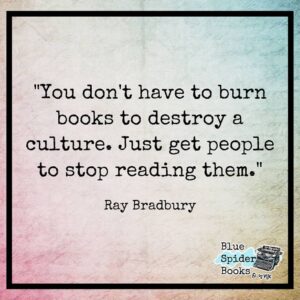
Preparing Children for the Real World:
Preparing children for the real world is a crucial rationale for encouraging their exploration of banned books. These challenged and controversial texts often delve unflinchingly into the complexities and challenges of life, addressing issues such as bullying, abuse, discrimination, and societal injustices that young individuals may inevitably encounter as they navigate their path to adulthood. Shielding children from these uncomfortable realities can leave them ill-prepared to face the harshness of the world. However, by engaging with banned books, children can safely and gradually explore these difficult topics within the pages of a book. This exposure not only helps them develop a deeper understanding of such issues but also equips them with the emotional resilience and coping skills necessary to confront adversity. Banned books become a bridge between the safety of childhood and the realities of adulthood, offering a controlled and guided space for young readers to explore challenging themes, enabling them to grow emotionally, empathetically, and psychologically prepared to face the complexities and uncertainties of the real world with greater confidence and fortitude.
Fostering Independence:
Fostering independence is a fundamental outcome of allowing children to explore banned books. When children are given the freedom to choose and read from a wide array of literature, including those with controversial or challenging content, they learn to exercise their own judgment and decision-making abilities. This autonomy sends a powerful message that they are capable of handling complex material and making informed choices about their reading preferences. Encouraging them to select their own books and engage with potentially controversial content not only promotes their self-confidence but also nurtures their independence and individuality. It empowers them to take ownership of their intellectual growth and learning journey, ultimately shaping them into more self-reliant and capable individuals who are unafraid to explore diverse ideas, even when they may be met with resistance or controversy. This sense of independence extends beyond their reading choices and becomes a valuable life skill, preparing them to make decisions, advocate for themselves, and navigate the complexities of the world with confidence and maturity.
Sparking Meaningful Conversations:
Sparking meaningful conversations is a profound outcome of children’s exploration of banned books. These contentious texts often contain themes and ideas that naturally provoke thought and dialogue, prompting children to engage in profound discussions with parents, teachers, peers, and mentors. Reading banned books opens doors to crucial conversations about complex societal issues, ethics, moral dilemmas, and the very essence of humanity itself. These dialogues provide invaluable opportunities for adults to guide children through nuanced and often challenging topics, offering context, sharing personal experiences, and helping them navigate the intricacies of the narratives they encounter. Such interactions not only foster open communication and mutual understanding but also strengthen the bonds between generations and across diverse perspectives. Banned books thus become a catalyst for deepening relationships and enriching the intellectual and emotional development of children, equipping them with the skills to engage in thoughtful, respectful, and informed conversations about the world they inhabit, ultimately preparing them to become compassionate, empathetic, and critically thinking individuals capable of contributing meaningfully to society.
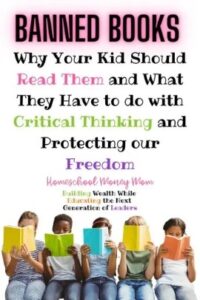
Here are a few examples of banned books often found in school libraries, along with the reasons they’ve been challenged and why they should be read:
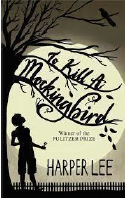
To Kill a Mockingbird” by Harper Lee
- Reason for being banned: Challenged for its portrayal of racial and social issues, offensive language, and mature content.
- Why it should be read: It offers a powerful lesson on empathy, racial injustice, and moral courage, providing valuable insights into the history of civil rights and fostering critical discussions about societal values.
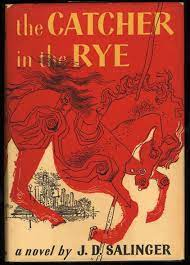
The Catcher in the Rye” by J.D. Salinger
- Reason for being banned: Frequently challenged for its use of profanity, sexual content, and portrayal of rebellion against authority.
- Why it should be read: It explores the complexities of adolescence, identity, and societal conformity, making it a relevant and relatable read for teenagers navigating the challenges of growing up.
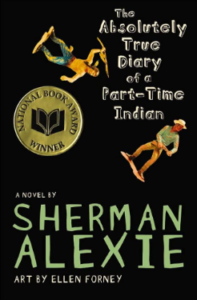
The Absolutely True Diary of a Part-Time Indian” by Sherman Alexie
- Reason for being banned: Frequently challenged due to its depiction of sexual content, racism, and offensive language.
- Why it should be read: It provides an authentic portrayal of the Native American experience and addresses issues of identity, belonging, and resilience, making it an important read for fostering empathy and understanding.
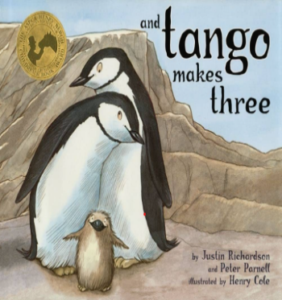
And Tango Makes Three” by Justin Richardson and Peter Parnell
- Reason for being challenged: This picture book, based on a true story, tells the tale of two male penguins in the Central Park Zoo who hatch an egg together and raise a baby penguin.
- Why it should be read: The book promotes themes of love, family, and diversity and can help children understand different family structures and relationships.
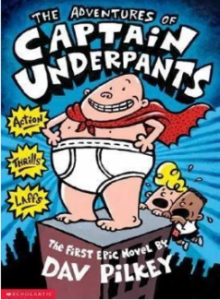
The Adventures of Captain Underpants” by Dav Pilkey
- Reason for being challenged: Some have raised concerns about its humor, perceived irreverence, and its use of bathroom humor.
- Why it should be read: This series can be enjoyed by young readers for its humor and creativity, and it can encourage reluctant readers to engage with books.
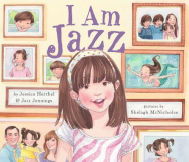
I Am Jazz” by Jazz Jennings and Jessica Herthel
- Reason for being challenged: “I Am Jazz” has been challenged due to its portrayal of gender identity and transgender issues. Some individuals and groups have objected to the book on ideological or religious grounds, believing it promotes ideas about gender that conflict with their beliefs.
- I Am Jazz” should be read to educate children about gender diversity, foster empathy and acceptance, and promote inclusivity in society.
These banned books should be read because they tackle important themes, challenge conventional norms, and encourage critical thinking. They provide opportunities for young readers to engage with complex issues, explore diverse perspectives, and develop a deeper understanding of the world around them. Reading these books fosters empathy, broadens horizons, and prepares students for a world where they will encounter a wide range of ideas and beliefs.
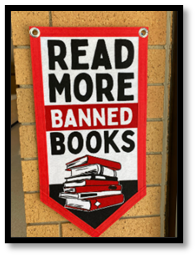
Conclusion
In conclusion, the act of banning books, even those intended for children, is a contentious and complex issue. It limits access to valuable literary works that can encourage critical thinking, broaden perspectives, and promote important discussions. As Ray Bradbury once said, “You don’t have to burn books to destroy a culture. Just get people to stop reading them.” Additionally, Victor Hugo reminds us that “He who opens a school door, closes a prison.” Banning books limits the intellectual growth of our children and restricts their freedom to explore diverse ideas, ultimately hindering their ability to become informed, empathetic, and open-minded individuals. It is our responsibility to protect the freedom to read and encourage our children to explore a world of knowledge through literature, as John F. Kennedy wisely stated, “Libraries should be open to all—except the censor.”
So, let us embrace the power of banned books and encourage children to read them with reasoning and open minds. Let us celebrate the diverse voices and perspectives they offer, for in doing so, we pave the way for a generation of compassionate, critical, and resilient individuals who will shape a brighter and more inclusive future. Let us fan the flames of curiosity, knowledge, and intellectual freedom, and in doing so, empower children to become active participants in shaping a better world.
References
- George, S. (2022, April). Why Children Should Read Banned Books. https://iasl-online.org/resources/Documents/newsletter/2022/IASL%20Newsletter_April%202022.pdf
- The Collegian. (2023, May 25). Banned book highlight: “speak” by Laurie Halse Anderson. https://www.kstatecollegian.com/2018/09/28/banned-book-highlight-speak-by-laurie-halse-anderson/
- Case study: In the night kitchen. Comic Book Legal Defense Fund. (n.d.). https://cbldf.org/banned- challenged-comics/case-study-in-the-night-kitchen/
- Centers, E. T. (2023, June 21). Should you care if your teen wants to read a banned book. Evolve. https://evolvetreatment.com/blog/teen-read-banned-book/
- Babb, T. (2022, June 23). Why banned books are the books your children should be reading. Popverse. https://www.thepopverse.com/why-banned-books-are-the-books-your-children-should-be-reading
- Samantha. (2023, April 4). 10 reasons to read banned books. Samantha M Clark. https://www.samanthamclark.com/2017/09/26/10-reasons-to-read-banned-books/
- Savat, S. (2022, May 3). What banned books can teach us about power in education – the source – washington university in St. Louis. The Source. https://source.wustl.edu/2022/05/what-banned-books-can-teach-us-about-power-in-education/
- Rhone, N. (2021, December 17). Opinion: Does reading banned books negatively impact young readers? ajc. https://www.ajc.com/life/opinion-does-reading-banned-books-negatively-impact-young-readers/GSTFO7YCN5DFHEGMHT6IFHQRW4/
- Scully, S. (2023, July 6). Why books should not be banned. Well+Good. https://www.wellandgood.com/why-books-should-not-be-banned/
- Vasak, M. (2020, August 26). Why your children should read banned books. Medium. https://medium.com/the-ascent/why-your-children-should-read-banned-books-e6246e395040
- Ringel, P. (2016, October 3). How banning books marginalizes children. The Atlantic. https://www.theatlantic.com/entertainment/archive/2016/10/how-banned-books-marginalize-children/502424/
- Trisha Tucker Associate Teaching Professor of Writing. (2023, August 30). Book bans reflect outdated beliefs about how children read. The Conversation. https://theconversation.com/book-bans-reflect-outdated-beliefs-about-how-children-read-189938
- Guardian News and Media. (2022, September 21). How to beat a book ban: Students, parents and librarians fight back. The Guardian. https://www.theguardian.com/books/2022/sep/20/us-book-bans-fight-school-library
- DeWitt, P. (2022, November 21). Banning books is not about protecting children. it’s about discrimination against others (opinion). Education Week. https://www.edweek.org/policy-politics/opinion-banning-books-is-not-about-protecting-children-its-about-discrimination-against-others/2022/02
- Landsman, J. (2022, February 11). What banned books can teach US. New Voices New Visions 20212022. https://pressbooks.pub/newvoicesnewvisions21/chapter/what-banned-books-can-teach-us/
- Berendsen, M. (2022, April 13). Opinion: Books should not be banned in schools. Tommie Media. https://www.tommiemedia.com/opinion-books-should-not-be-banned-in-schools/
- Why your kid should read banned books. Common Sense Media. (n.d.). https://www.commonsensemedia.org/articles/why-your-kid-should-read-banned-books#:~:text=Banned%20books%20often%20deal%20with,%2C%20prejudice%2C%20and%20sexual%20identity.
- Yuko, E. (2023, February 15). What is book Banning, and how does it affect society? Reader’s Digest. https://www.rd.com/article/book-banning/
Cite this article in APA as: Shaji, S. Unlocking minds: The battle over banned books and the power of free thought. (2023, October 11). Information Matters, Vol. 3, Issue 10. https://informationmatters.org/2023/10/unlocking-minds-the-battle-over-banned-books-and-the-power-of-free-thought/
Author
-
For the past 17 years, I have been employed as a PRT-Librarian at Somerville School Noida. My love for books and storytelling has made me an avid reader, and I take great pleasure in captivating young minds with narrated tales. My primary objective has always been to instill a passion for reading in children, and during library periods, I strive to make the experience engaging through various activities. Writing is another area where my passion lies, and whenever I find the time, I enthusiastically express my thoughts and pen down book reviews as well.
View all posts



